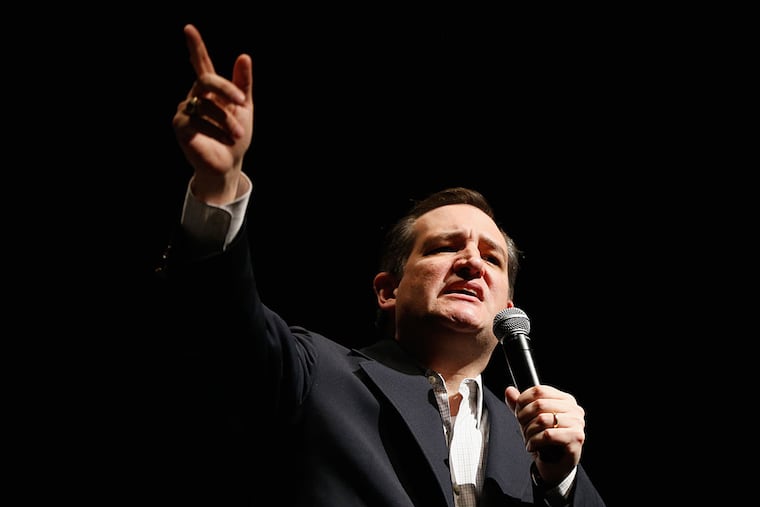N.J. judge hears two challenges to Cruz eligibility
MERCERVILLE, N.J. - A New Jersey administrative law judge on Monday heard two challenges to GOP presidential candidate Ted Cruz's eligibility to appear on the New Jersey ballot, based upon the Texas senator's having been born in Canada.

MERCERVILLE, N.J. - A New Jersey administrative law judge on Monday heard two challenges to GOP presidential candidate Ted Cruz's eligibility to appear on the New Jersey ballot, based upon the Texas senator's having been born in Canada.
The judge, Jeff Masin, said he would issue a decision Tuesday on the challenges to Cruz's eligibility to appear on the June 7 primary ballot. The decision is expected to be reviewed by Lt. Gov. Kim Guadagno, who is New Jersey's secretary of state.
At a news conference Monday, Gov. Christie - a Donald Trump supporter - said he was not aware of the hearing, but did not question Cruz's citizenship.
One of the challenges was brought by three South Jersey residents, and the other was by a law professor who lives in Maryland and is running for president as a write-in candidate in New Jersey.
Both parties argued that because Cruz was born in Calgary, Alberta, he is not a natural-born citizen, and thus ineligible for the presidency. Cruz's mother was born in Delaware, while his father was born in Cuba. The senator released his birth certificate in 2013.
Shalom Stone, a New Jersey attorney representing Cruz, argued that the three from South Jersey - Fernando Powers of Blackwood, Donna Ward of Mantua, and Bruce Stom of Winslow - and professor Victor Williams do not have standing to challenge Cruz's eligibility. Stone also said the state does not have authority to decide the question.
Masin noted that in 2012, he denied a challenge to President Obama's eligibility to appear on the New Jersey ballot. That challenge was argued by attorney Mario Apuzzo, who represented the three South Jersey residents in the Cruz challenge Monday.
In the Obama case, the courts "affirmed my decision," rather than saying, "This is not something the courts can even discuss," Masin said.
As for "natural-born citizen," Stone said the words in the U.S. Constitution "have meaning given to them by English common law" at the time of their adoption. He directed Masin to his brief for arguments and cases in support of Cruz's position.
In his brief, Stone wrote that because Cruz's mother was a U.S. citizen "who was physically present in the U.S. for more than 10 years, including at least five" after turning 14, Cruz was "a U.S. citizen at the moment of his birth - and thus is a 'natural born citizen' " eligible to be president.
The Pennsylvania Supreme Court recently declined an appeal by a Pittsburgh man who challenged Cruz's eligibility to appear on the ballot in the April 26 primary. A Commonwealth Court judge had ruled that Cruz is a natural-born citizen.
Masin said the Pennsylvania decision was the only one he knew of that addressed the merits of the arguments against Cruz's eligibility. Other challenges have been dismissed on procedural grounds, Masin said.
Two of the challengers to Cruz's eligibility in New Jersey, Williams and Powers, said they support Trump, who has raised questions about his rival's eligibility. But Williams said he was Trump's opponent in states where he is running as a write-in candidate, including New Jersey.
Williams, a professor at the Columbus School of Law in Washington, told the hearing that while Cruz is an American citizen, he is not a natural-born citizen.
Williams, who has filed challenges to Cruz's eligibility in a number of states, later told reporters he was motivated by reading about 2012 presidential candidate Mitt Romney's father, George W. Romney, who was born in Mexico to parents who were both U.S. citizens. George Romney ran for the Republican nomination for president in 1968.
"This isn't just about this election," Williams said, but to set "historic precedent."
"No one actually challenged him," Williams said of George Romney.
856-779-3232
@maddiehanna